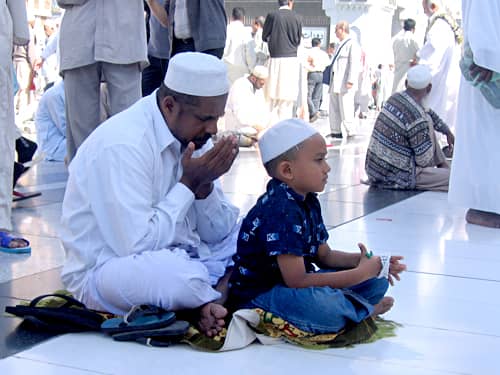A new PBS documentary, "Muhammad: Legacy of a Prophet," offers a very different view. So different that various commentators--including Daniel Pipes, director of the Middle East Forum--have complained that the U.S. Government (through the Corporation for Public Broadcasting) is promoting pro-Islam propaganda. The film's creators contend it is an effective and credible presentation of the facts of Muhammad's life and how he is experienced by many Muslims today. [Full disclosure: two of the film's three producers, Michael Wolfe and Alex Kronemer, write regularly for Beliefnet.]
Muhammad was an illiterate merchant who lived 1,400 years ago. His pronouncement that there was only one God was revolutionary in its day--particularly threatening the livelihood of ruling Meccans who profited from Mecca's role as Arabia's most popular pilgrimage center. Yet in a 23-year period, Muhammad united the Arab people, converted them to monotheism, and ended decades of tribal war.
"Unlike Jesus or the Buddha, who seem to have been purely spiritual leaders with no temporal responsibilities whatever, Muhammad found himself head of state," author Karen Armstrong points out in one of her many trenchant scenes in the film.
It is a remarkable story, and the two-hour documentary, which airs Dec. 18, for the most part succeeds in telling it. Because showing images of Muhammad is considered offensive by Muslims, a biographical film about the man faces obvious challenges. The producers use Arabic calligraphy, lushly photographed scenes of pilgrims making Hajj, Bedouins in the desert, and sweeping views of Saudi and Jordanian wastelands to transport viewers to Arabia in the time of Muhammad. Although these techniques are familiar to documentary audiences, and well-executed here, at times the people-less scenes dragged on.
The producers' creative antidote to that problem is to interweave the ancient biography of Islam's founder with contemporary personal narratives of American Muslims--a congressional aide, a critical care nurse, and a Brooklyn fire marshal and Ground Zero veteran. Their stories are the soul of the documentary, as they movingly reflect on the role of Muhammad in their lives.
"The Qur'an teaches you that the saving of one life is as if you've saved all of humanity," says Brooklyn fire marshall Kevin James, child of a Jewish mother and a father who is Native American and African American.
And yet, says Islamic calligrapher Mohamed Zakariya: "Islam is really a soft thing. It's not a hard thing."
Another compelling character is Najah Bazzy, a critical care nurse and second-generation Muslim American living in Dearborn, Michigan. Her hometown has seen an influx of Muslim immigration as a result of the Gulf War. Muhammad, she says, is her guide.
"We live our lives through his examples, but he's not God," she explains. "So how I walk, and how I speak, and how I carry myself, and how I treat my husband, and how I treat my mother and my father, and how I behave as a sister and a daughter and a nurse and a friend and a neighbor, that's all prophet Muhammad in action."
The film points out that Muhammad improved women's legal situation enormously: he allowed women to inherit money, he outlawed female infanticide, and he gave them legal rights in marriage. The producers take us to a woman's group in New York, where Muslim women talk about gender relations in their faith. The scene is a little forced, and glosses over women's issues in Islam. Though the film took great pains to describe Muhammad's relations with his wives--particularly Khadijah, his first and quite powerful wife--this part of Muhammad's story wasn't tied well to contemporary Muslim women.
Daniel Pipes, one of the film's conservative critics, points out that PBS' earlier documentary on Jesus was filled with contemporary scholarship that debunked the interpretations held most dear by many devout Christians. This documentary does not do quite the equivalent for Muhammad. It includes Karen Armstrong, a world-renowned non-Muslim scholar of the faith; John Voll, an Islam scholar at Georgetown University; Cherif Bassiouni, a law professor at DePaul University; Seyyed Hossein Nasr, professor of Islamic Studies at George Washington University; and Reuven Firestone, professor of Medieval Judaism and Islam at Hebrew Union College in Los Angeles. These are all terrific choices, but they are sympathetic voices. What you don't see is scholars who may suggest alternative motives for Muhammad's actions, other than his desire to unite his people and spread monotheism-and surely he had other motives.
On the other hand, a documentary about Jesus, whose basic story is well known to Americans, can afford to venture deeper into scholarly disputes. Given the basic ignorance of Muhammad's life and message, it was defensible for the documentary makers to focus on conveying Muhammad as experienced by Muslims. In general, the depiction of Muhammad in this documentary is in line with most reputable Islamic scholars. (The filmmakers like to note that "the film is an interfaith effort that not only included Muslims, Christians, Jews, and Sikhs, but also atheists and agnostics" and the executive producer, Michael Schwarz, is Jewish, not Muslim.)
And there were moments in the film, as Muhammad's life story plodded through its middle passage, when I thought the film would have been better about 30 minutes shorter.
But viewers who stick with it to the end are rewarded. The last scenes parallel Bazzy's care of a terminally ill patient with the end of Muhammad's life. The story of how Muhammad died resonates with Bazzy talking about helping her Muslim patients through the end of their lives. We watch as she holds the hand of an old man, an old friend, crumpled and near death in the hospital. And we hear her talk about Muhammad's dignity in his dying, and using him as a model in her work.
Then she says of the prophet: "Our reverence is to God-but our reference is to him."

